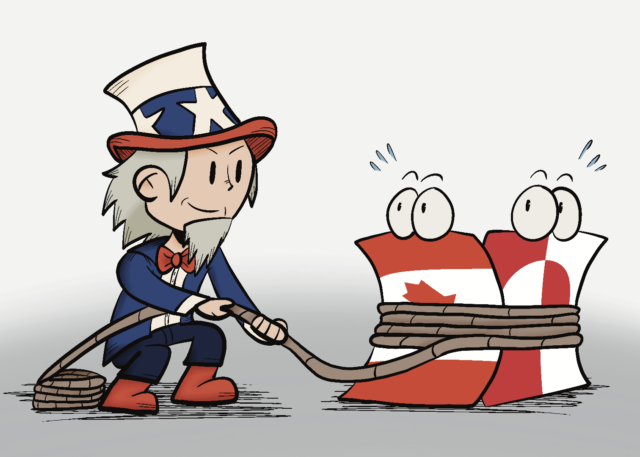By The Editorial Board
“Manifest Destiny” — the words evoke visions of top hats and the Wild West, a map detailing the Louisiana Purchase, and perhaps a painting of an angel leading settlers into the frontier, if you remember that from history class.
But to a new generation, the words could conjure up a very different sort of image, one where land wars are waged over late-night Tweets and where the top hats have been traded in for red ball caps. Where once expanding from sea to shining sea meant looking towards California, we’re now setting our sights on the East for Canada and Greenland, and the results could be disastrous.
Since the start of his second term, President Donald Trump has been not-so-subtly expressing his desire to annex Greenland, a semi-autonomous territory of Denmark, though he first hinted at this in 2019. Initially, it almost seemed like a joke, but it quickly became serious when the administration began to send envoys of ambassadors to the chilly island this year.
The move has been regarded as highly aggressive and wildly unpopular. In response, Greenland Prime Minister Jens-Frederik Nielsen said, “Trump says that the United States is getting Greenland. Let me be clear: the United States won’t get that.”
A new poll shows that 85% of Greenlanders do not want to be annexed by the United States, but that hasn’t at all deterred Trump from continuing his courtship. On Saturday, he told NBC News that he will “never take military force off the table” in order to possess Greenland. Let’s take a step back and let those words sink in: a member of NATO has threatened to use military power to forcibly seize a (mostly) self-governing territory from another NATO member despite the will of both countries, the consent of the governed and largely without support back home.
The same applies for Canada. Another NATO ally, Trump sardonically calls the country the 51st state as he threatens crippling tariffs.
“The only thing that makes sense is for Canada to become our cherished Fifty First State,” he wrote on social media last month. “This would make all Tariffs, and everything else, totally disappear.”
Unsurprisingly, 90% of Canadians do not want to be Americans. Take another step back. Why is this even a discussion?
The expressed reason that the administration has given is that Greenland occupies a fortuitous national security position and is in possession of valuable natural resources. Be that as it may, democratic leaders — not the liberal kind, but those who believe in free and fair elections and the general concept of “We the People,” — don’t engage in this sort of behavior. The age of conquest and colonialism is hundreds of years behind America, and it needs to stay that way. Unfortunately, the president believes it pays dividends to look like a strongman when we’re competing against dictators like Vladimir Putin and Xi Jinping, and maybe a part of him admires the kind of power that can waltz into Ukraine or Taiwan and just, well, take it.
As for Canada, the reasoning here still escapes explanation other than looking bigger on a map. But consider this: America’s history is one best told in two parallel throughlines. There’s the American impulse to expand and engulf, to gather more and more land, resources and power through domination and punishment, but also the American spirit that shattered the shackles of slavery, enfranchised the disenfranchised and fought against tyranny in Europe.
Two hundred and fifty years ago, our country founded itself on freedom and the crazy experiment of democratic self-governance. We have spent those two and a half centuries, in our loftiest legends and myths, striving daily towards more freedom because that is who we are at our core — not an empire, not a conqueror, but a liberator and a keeper of independence.
Setting out to forcibly annex entire countries and self-governing territories echoes the darker parts of America’s past, not the glorious moments in our history that we should be living up to if we want to somehow “make America great again.” This is a crossroads in our history where the people get to decide which story we want to continue to write and which chapter will be closed forever. We need to make the right choice.



